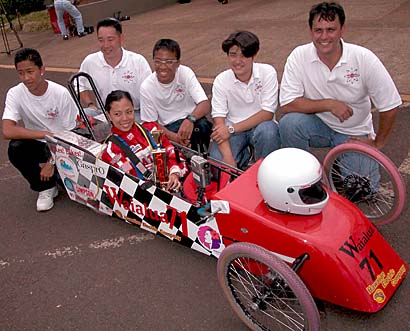
CRAIG T. KOJIMA / CKOJIMA@STARBULLETIN.COM
Ashley Yoshizu sits in the driver's seat of the national champion Waialua High School electric car. Jovi Lo, left, adviser Glenn Lee, Joseph Gudoy, Brandon Sakata and adviser Tim Pregana surround the car.
Waialua High team
electrifies America Cup
Even before the race started, Waialua High School's electric car caused a stir.
While 42 other vehicles from around the country arrived ready to roll, Waialua's car showed up in bits and pieces.
"Everybody else had those U-Hauls," said Glenn Lee, physics teacher at Waialua.
"While they were waiting around for the race, relaxing and eating hot dogs, we were trying to put our car back together."
The team managed to cobble everything into place in time, and by the end of the three-day America Cup 2003 Electrathon Event in Portland, Ore., all eyes focused on Hawaii again: Waialua's students were declared national champions.
"It was a shock that we won," said senior Ashley Yoshizu, the car's 5-foot, 101-pound driver, who got the job because she is the only team member with a driver's license. Other members of the team were senior Tyson Sumile and sophomores Joseph Gudoy, Jovi Lo and Brandon Sakata.
Led by industrial arts teacher Tim Pregana and Lee, the group was the first from Hawaii ever to compete in the America Cup. Their car, which had to be pulled apart to fit into airline baggage, stood out as the only four-wheeler in a fleet of three-wheeled cars.
The 13 students in Waialua's electric-vehicle class -- most of whom are in special education -- had built the car for the Hawaiian Electric Electron Marathon in March, where they placed third, behind Sacred Hearts Academy and West Hawaii Explorations Academy. Four-wheel vehicles handle the sharp turns of that LeMans-type course better.
But three-wheelers are preferred for the long straightaways of the America Cup because they have less friction against the track.
"We won because we were consistent," said Gudoy. "Many teams wanted to go fast in the beginning, but they didn't last."
The race, held May 24-26, is a distance contest, with each team logging as many laps as it can in one hour per day, over three days. Waialua and another team each logged 51 laps, or 96.9 miles, but Waialua won because it completed its last lap 42 seconds before the other team did.
And that was despite suffering a flat tire the first day and leaving one gear at home in Hawaii, forcing them to substitute a different size.
Team members designed a small, sleek vehicle around their tiny driver, who had to carry 70 pounds of ballast aboard to make up for her light weight.
The team included industrial arts and regular science students as well as special-education students.
"The special-needs kids had really good ideas," Yoshizu said. "They came up with the basic structure of the car."
Everyone involved was a rookie because Waialua couldn't afford to field an electric vehicle team last year. It did so this year thanks to a grant from Pi Lambda Theta, in-kind donations from Hawaiian Airlines and the sponsorship of Hawaiian Electric Co.
